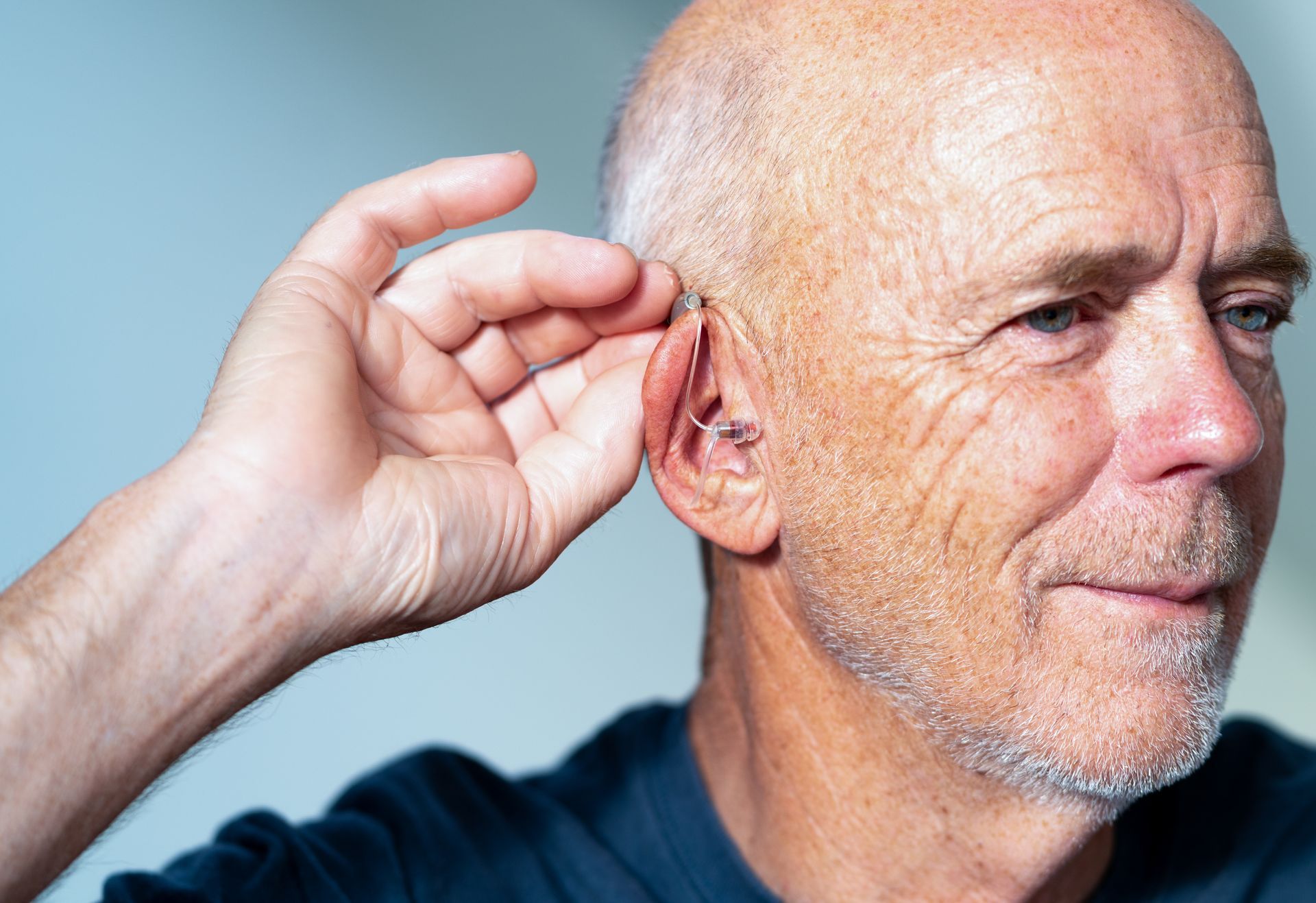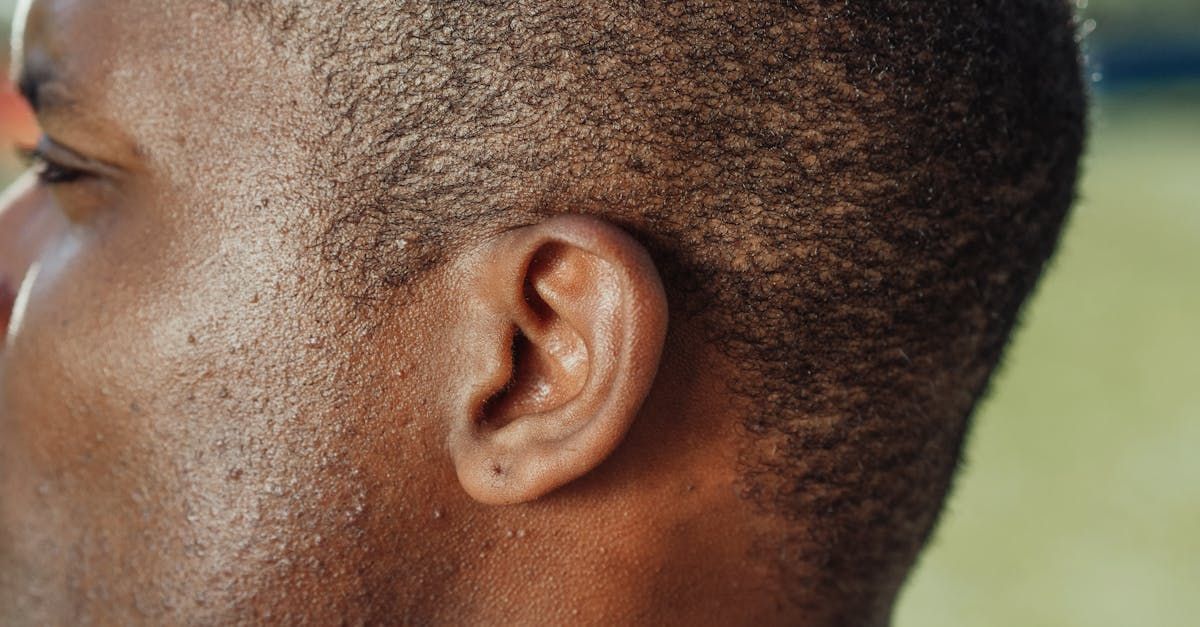
Hearing technology has come a long way over the years; however, one aspect of hearing loss that many hearing aids have difficulty addressing is trouble understanding speech in noise. Fortunately, some of today’s state-of-the-art devices can solve this problem utilizing deep neural networks (DNN) and artificial intelligence (AI). Sensorineural hearing loss causes difficulty understanding speech in background noise. This type of hearing loss is caused by damage to the hair cells of the inner ear that convert soundwaves into electrical energy, which are then interpreted by the brain. This causes the quality and quantity of the signal sent from the ears to the brain to diminish over time, resulting in the brain expending more energy and effort to make sense of it. DNNs may help improve the transmission of the neural code, making hearing easier on the brain. [1] It’s important to know what DNNs are to understand how they can help. DNNs are a subset of AI. They rapidly analyze large data sets so that they can teach hearing aids and other technological devices how to respond to data like a human would, all while verifying accuracy and making corrections. DNNs are beneficial in hearing technology because they can help with speech enhancement. DNNs can be applied as “time-frequency masks,” meaning select sounds—like speech—are allowed while other sounds are suppressed. DNNs can also identify and separate multiple voices, selecting a primary voice to emphasize and secondary voices to suppress. This feature can help hearing device wearers in a variety of settings. For example, at a restaurant or party, the hearing device can emphasize a conversation partner, allow other nearby voices at a reduced volume and suppress background noises such as dishes clinking. Schedule an appointment to talk to Center for Hearing about our vast state-of-the-art hearing solutions today— (239) 434-0086. [1] Published by Douglas L. Beck. (2021, January 15). Deep neural networks in hearing devices. Retrieved April 2, 2021 from https://www.hearingreview.com/hearing-products/hearing-aids/deep-neural-networks

A Boston biotech startup is attempting to develop the first gene therapy treatment for hearing loss. If successful, it promises to offer new hope to the estimated 300,000 Americans who suffer from gene-based hearing loss—a number that includes more than 4,000 newborns. The timing may not be ideal, but biotech companies have been largely immune from the effects of the COVID-19 pandemic and ensuing recession. Developing new drugs takes years, so these companies are better able to weather storms. And the efforts of biotechnology companies that are focusing on tools to prevent and treat potentially fatal health threats has resulted in soaring stock values for many of these companies, even in the face of the current crisis. Akouos, the Boston startup, was founded in 2016. Its goal is to develop the first gene therapy to treat hearing loss and is targeting a specific form of deafness that results from mutations in a single gene. They are experimenting with adeno-associated viruses, using them as vectors to deliver DNA that encodes a functioning gene in certain target cells. Around 7,000 people are afflicted with this type of genetic hearing loss. Adeno-associated viruses are considered viable candidates because they don’t usually cause disease and can be customized to treat a variety of genetic conditions. The company has partnered with two influential organizations: Massachusetts Eye and Ear and Lonza, a Swiss manufacturing company that holds contracts with various pharmaceutical makers. Manny Simons, Akouos’ co-founder and chief executive, holds a degree in neuroscience from Harvard College, a Ph.D. in biomedical engineering from the Massachusetts Institute of Technology, and an MBA from Harvard Business School. His desire to help those with hearing loss stems from his passion for playing the piano. “It’s easy to take hearing for granted,” said in a Boston Globe interview. “Maybe because music has been important to me, it’s something that I take a little less for granted.” [1] [1] Saltzman, J. (2020, June 22). Akouos, a startup developing a gene therapy for hearing loss, raises IPO value to $125 million - The Boston Globe. Retrieved June 30, 2020, from https://www.bostonglobe.com/2020/06/22/business/ipo-upped-akouos-boston-startup-working-gene-therapy-hearing-loss/

A recent study by the U.S. National Institute on Aging showed a link between hearing loss and dementia. It found that patients older than 60 had a 35% higher risk of developing dementia if they suffered from hearing loss. The study, conducted over a four-year period, monitored over 600 patients for signs of dementia. Data showed those with moderate to severe hearing loss developed degenerative cognitive disorders at a higher rate than others, concluding that for every additional loss of 10 decibels of hearing capacity, a patient’s risk for Alzheimer’s increased 20%. While several theories for this correlation exist, more research is needed to find a definitive association. “Hearing loss might result from damage to nerve cells,” Dr. Richard B. Lipton says. “That means damage to the hearing organ and the hair cells that pick up the pattern of vibration the sound produces in the ear. And if there’s damage to the neurons that mediate hearing, that may be a kind of marker for similar damage to nerve cells involved in memory and higher cognition.” Lipton also believes the social isolation that often accompanies hearing loss may lead to less cognitive engagement, crucial in preventing dementia. This in turn may increase the risk for Alzheimer’s. The bottom line is, dementia and Alzheimer’s have less to do with chronological age than previously believed. Researchers are focused instead on biological age and the overall health and lifestyle of those patients who exhibit early symptoms of cognitive decline.

Brown noise is having a moment. This past summer, people with ADHD began posting videos online of their reactions to hearing brown noise for the first time. On YouTube, brown noise videos have been viewed millions of times, and Spotify has playlists featuring the sound. Wondering what all the fuss is about? Like white noise, brown noise contains all the frequencies of sound that the human ear can hear, but it has a lower, deeper quality that some people have found alleviates their stress, sharpens their focus and lulls them to sleep. 1 What the Research Says Studies show that immersive sounds like white, brown and pink noise may help the human brain relax, concentrate or sleep, particularly for people with ADHD. 2,3 However, according to Yamialis Diaz, an assistant professor at NYU Langone Health, brown noise doesn’t necessarily provide better brain-soothing benefits than other colors of noise. “No research suggests that a specific kind of noise is the key. Frequencies can activate and stimulate the brain in different ways,” she noted. 4 Noise Therapy and Sleep Although individuals may use noise machines to help them drift off to dreamland, the jury is out on whether doing so results in a better night’s sleep. A 2020 review of 38 studies on white noise found limited evidence that listening to it can improve sleep. 5 On the other hand, a small study that analyzed the brain waves of individuals who listened to pink noise while sleeping revealed that the participants enjoyed deeper sleep than when they slept without the noise. 6 And while personal anecdotes via TikTok claim that brown noise is an ideal sleep aid, research on the topic is scarce. Whether you use noise therapy or not, it’s best to find out the source of your sleeping issues. Center For Hearing’s expert sleep team can help—call (239) 434-0086 to schedule your sleep consultation. 1,4 Blum, D. (2022). Can brown noise turn off your brain? The New York Times. https://www.nytimes.com/interactive/2022/09/23/well/mind/brown-noise.html 2 Pickens, T. (2019). White noise as a possible therapeutic option for children with ADHD. Complement Ther Med. https://pubmed.ncbi.nlm.nih.gov/30670235/#:~:text 3 Lu, S. (2020). Spectral content (colour) of noise exposure affects work efficiency. Noise Health. https://www.ncbi.nlm.nih.gov/pmc/articles/PMC7986458/ 5 Riedy, S. et al. (2021). Noise as a sleep aid: a systemic review. Sleep Medicine Reviews. https://www.sciencedirect.com/science/article/abs/pii/S1087079220301283?via%3Dihub 6 Zhou, J. et al. (2012). Pink noise: effect on complexity synchronization of brain activity and sleep consolidation. Journal of Theoretical Biology. https://www.sciencedirect.com/science/article/abs/pii/S0022519312001798?via%3Dihub

Stay on Top of Your Brain Health With Cognivue Thrive As we age, our bodies change (hello, creaky joints), and our brains do, too. Periodically forgetting recent events like where you put your keys is normal, but consistently having trouble completing tasks without help or not being able to name items isn’t. Interested in knowing where your brain health stands? Center for Hearing is pleased to offer our patients Cognivue Thrive—a revolutionary diagnostic tool for cognitive function. Get Peace of Mind Cognivue Thrive is a portable, self-administered, computerized screening device that measures cognitive function and takes minutes to complete. It empowers you to take control of your brain health by uncovering any cognitive issue as early as possible, ensuring that you can get help faster. The Cognivue Thrive experience begins with a four-minute introductory video followed by tests measuring memory, executive function, visuospatial abilities, processing and reaction time. Your audiologist reviews the results and uses them in clinical decision-making to set expectations, make referrals as appropriate and determine success. They will also send these results to your primary care doctor or other health care provider. The Hearing Loss and Cognitive Decline Connection If you or someone you love has hearing loss, evidence shows that you’re at a higher risk of cognitive decline than someone with normal hearing, making Cognivue Thrive even more crucial for your overall well-being. In a study published in 2013, 2,000 older adults (average age: 77) were tracked for six years. Those who began the study with the worst hearing loss were 24% more likely to see a decline in cognitive ability compared to individuals with normal hearing. 1 But separate research also shows that patients who get treatment for their hearing loss with hearing devices reduce their odds of cognitive decline. 2 Early detection of hearing loss and cognitive issues is key. We can uncover both for you at Center for Hearing by incorporating Cognivue Thrive into your comprehensive hearing evaluation. Call us today, (239) 434-0086, to schedule an appointment. 1 Lin, F.R. et al. (2013). Hearing loss and cognitive decline in older adults. Jama Intern Med 173(4): 293-299. https://jamanetwork.com/journals/jamainternalmedicine/fullarticle/1558452 2 Maharani, A., Dawes, P. et al. (2018). Longitudinal relationship between hearing aid use and cognitive function in older Americans. Journal of the American Geriatrics Society. https://pubmed.ncbi.nlm.nih.gov/29637544/

Is It Your Hearing, or Is It Your TV? You’re watching the latest episode of your favorite TV show, wrapped up in the story and hanging on each actor’s every word. Suddenly, you can’t make out a sentence, blurt out, “What did she say?” and completely lose the plot. Struggling to hear your TV is a telltale sign of hearing loss. Unfortunately, modern TVs, speakers and other factors don’t make it any easier. Why Hearing Your TV Is Sometimes Hard Poor TV speaker sound—The speakers in your TV are likely tiny, offer unsatisfactory sound quality and are set to the manufacturer’s setting. To fine-tune your listening experience, go to your TV’s Sound menu and select Dialogue, News or Speech Boost mode to make speech clearer. Also, consider turning down the bass, which can overwhelm dialogue. Soundbar or external speaker snafus—These devices likely provide better sound than your TV speakers but can still be insufficient. You’ll want to ensure speakers aren’t too close to a wall or inside a cabinet, activate the speech-improving Movie mode on your soundbar and remove speaker grills. Movie dialogue getting more challenging to understand—Today’s films may use a more real-life style, where you’re not supposed to hear every word and the actors mumble. On set, capturing speech with a boom mic close to an actor may not work with the visuals of the shot, leading to softer, less clear dialogue. And mixing sound for TV streaming can be challenging, resulting in less-than-optimal sound quality. Regardless of your TV settings, if you find yourself needing to turn the volume up, you should talk to our expert audiologists about a hearing test. In the meantime, consider using the Closed Captioning mode on your TV or a streamer (if you already have hearing aids) to help you hear speech better.

How Untreated Hearing Loss Affects Overall Health The average hearing loss patient waits seven years before seeking help, which can take a toll on their quality of life. 1 The longer someone puts off getting treatment, the more likely they are to face negative consequences for their well-being—hearing loss is linked to several common health conditions. The Impact on Your Health Your brain makes sense of the sound your ears take in, allowing you to hear. Untreated hearing loss causes your brain to process fewer sounds, leading to some pathways atrophying or being used for other functions, which can contribute to health problems. People with hearing loss: · Have three times the risk of falling 2 · Are up to five times more likely to develop dementia 3 · Are at a greater risk of experiencing depression and social anxiety 4 · Can struggle to communicate and become socially isolated Their financial health can also be affected—research shows that untreated hearing loss can decrease one’s annual income by up to $30,000. 5 How to Cope: Get an Annual Hearing Test Hearing loss usually develops gradually, making it difficult to notice for many patients. Since early support is key, scheduling an annual hearing test with an audiologist is crucial. Annual testing will help detect any hearing loss as soon as possible, allowing an audiologist to treat your hearing loss more efficiently and effectively to help you maintain a good overall quality of life. The Role of Hearing Aids and Communication Strategies If your audiologist determines that you have hearing loss, hearing aids can help you communicate, connect and even improve your health. Evidence shows that wearing hearing aids can enhance balance, 6 slow cognitive decline 7 and reduce depression in patients. 8 Using communication strategies is another way to make living with hearing loss easier. Turning on your TV’s closed captions, ensuring you can see a person’s face when they’re talking and moving to a quieter location to speak together are all examples of communication-enhancing techniques. Now’s the time to take control of your hearing—and your health. Call (239) 434-0086 to schedule your hearing evaluation.

Roughly one in five Americans experience tinnitus, the perception of noise in the ears frequently compared to a ringing or similar sound. Many factors contribute to tinnitus; now, we can add COVID-19, thanks to a recent study from Angela Ruskin University in Cambridge, England. [1] The study, which looked at 3,103 people with tinnitus from 48 countries, was conducted in cooperation with both the British Tinnitus Association and the American Tinnitus Association. The results, published in the medical journal Frontiers in Public Health, found that 40% of COVID-19 patients experienced an increase in tinnitus symptoms. While the majority studied in Cambridge had already been diagnosed with tinnitus, a small number appeared to have developed symptoms due to the coronavirus, leading researchers to speculate that tinnitus may be an additional, though somewhat rare, symptom of COVID-19. Social distancing was another contributing factor to increased symptoms, according to a significant number of tinnitus sufferers whose work and lifestyle routines were disrupted (46% of UK patients and 29% from North America). Stress, loneliness and difficulty sleeping made tinnitus more bothersome for 32% of respondents. Other factors mentioned by participants that exacerbated tinnitus symptoms include increased video calls, noisier home environments, homeschooling, and increased coffee and alcohol consumption. Along with the challenges in accessing health care due to COVID-19 restrictions, it’s clear the pandemic impacts those with tinnitus across the globe. “Some of the changes brought about by COVID-19 appear to have had a negative impact on the lives of people with tinnitus, and participants in this study reported that COVID-19 symptoms are worsening or, in some cases, even initiating tinnitus and hearing loss,” explained Dr. Eldre Beukes, a research fellow at ARU and Lamar University in Texas and lead author of the study. With a long list of possible causes, it’s best to schedule an appointment with Center for Hearing to get to the root cause of your tinnitus. [1] Beukes EW, Baguley DM, Jacquemin L, et al. Changes in tinnitus experiences during the COVID-19 pandemic. Frontiers in Public Health. 2020;8. DOI= 10.3389/fpubh.2020.592878 .
Navigating the early stages of your child’s life is an exciting and sometimes overwhelming experience filled with many important things to learn. One crucial aspect of your child’s development is their hearing health. Understanding infant hearing loss can be overwhelming, but recognizing the signs and knowing the steps to take if your child is diagnosed with hearing loss can empower you on this journey. Causes of Congenital Hearing Loss Hearing loss in infants can be either congenital (present at birth) or acquired (developed later) . Congenital causes may include but are not limited to infections, premature birth, birth injuries, low birth weight, lack of oxygen at birth, maternal diabetes, drug or alcohol use during pregnancy, high blood pressure during pregnancy and genetics. Genetic factors are responsible for 50% of hearing loss cases . These can be syndromic (associated with conditions like Down syndrome or Treacher Collins syndrome) or nonsyndromic (inherited hearing loss without other associated symptoms). Your provider may be able to look at your family history and run a few tests to identify if your child is likely to have genetic hearing loss. While you won’t be able to change the outcome, knowing about your child’s hearing loss ahead of time can help you prepare. Infant Screenings and Signs of Hearing Loss In 2020, over 98% of newborns in the U.S. were screened for hearing loss shortly after birth . This early detection is crucial, but parents should also watch for signs of hearing loss developing later, including a lack of response to sounds or delayed language development. What Are Your Treatment Options? Depending on your child’s type and severity of hearing loss, their audiologist may recommend hearing aids, cochlear implants or speech therapy: Hearing aids are suitable for infants within the first few weeks or months. These small but advanced devices work by amplifying sounds to help those with mild to profound hearing loss understand the world around them . A child with profound hearing loss may be a candidate for cochlear implants at nine months old. Cochlear implants are surgically implanted devices that bypass damaged ear parts to aid those with severe hearing loss who are unresponsive to hearing aids. Speech therapy is essential for developing communication skills. To help avoid delays in language development, it is best to start speech therapy early. Learning that your child has hearing loss can be daunting, but know that the experts at Center For Hearing are here to support you through your journey. The Relationship Between Exercise and Hearing Loss Muffled Hearing: Common Causes and Solutions Are There Apps for Tinnitus Management
From strengthening muscles and improving cardiovascular health to boosting mood and reducing stress, the advantages of regular exercise are well-documented. However, its positive impact extends beyond just physical fitness and extends to include your hearing health. Advantages of Exercise for Hearing Health Engaging in regular physical activity has been linked to various benefits for hearing...

